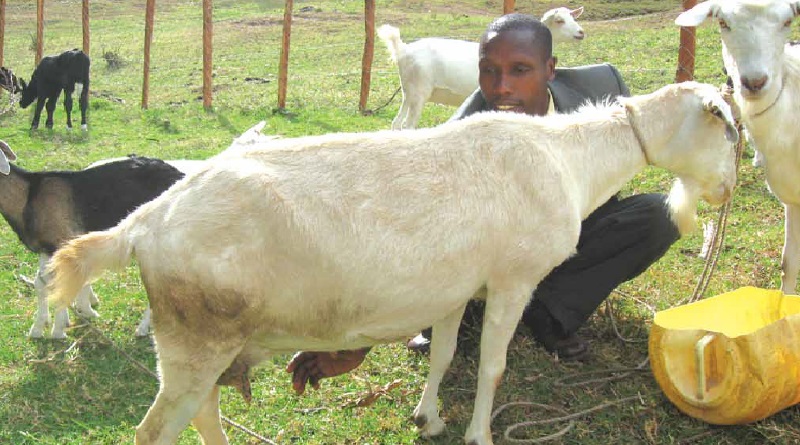

Robert Macharia Kinyua, the 39-year-old worked earlier as a transport manager with Comtech a technology firm in Nairobi, before being retrenched in 2011 and begins dairy goats farming.
“I then started researching on a venture that I could get into rather than looking for another job. I then decided to pursue farming but would still do menial jobs in order to provide my family then new venture was taking root. In 2014 I left where I was earning Sh1,500 daily to focus on dairy goat farming. I have not regretted,’ He begins his story.
Without being certain about what the world of business held out for him, Macharia plunged into it nonetheless, hoping for the best and after few years down the road, he is a happy man.
The former transport manager owned a 40 by 60 feet plot in Githurai 45, Kiambu County which he acquired in 2007 for Sh350,000, with his savings since 2003 when he started working.
“I used Sh20,000 from the savings to buy a German Alpine goat breed from a farmer in Embu to start my farming venture. The goat initially produced only enough milk for my family and none for sale. This made me to buy another goat at Sh18,000. This drained my savings and I was forced back into employment. I got a job with SportPesa, a sports betting platform, as a driver,” Macharia traces his farming venture.
He was being paid Sh25,000 per month as his starting salary and was increased to Sh45,000 per month making it a good source of income for a struggling farmer like him. “I would not let my farming ambition to die while under employment.”
READ ALSO: Mr Wambugu, who is a school drop-out, says he is able to bank more than Sh80,000 from tree tomato farming
Macharia resigned again from the job to embark on full time dairy goat farming in 2017 May. since his herd had increased to 15. Today he has 26 goats, all of which are German Alpine breed.
Getting feeds for the animals sometimes becomes a challenge therefore he feeds them on dry matter and silage which helps him preserve green fodder for use in the future.
Being an urban farmer, he cannot easily access green fodder, that’s why he opts for dry matter and silage. At times he hires a truck to Naivasha at a cost of Sh20,000 per trip to purchase hay and grass. One trip has 200 bales that feed the goats for six months. “I spend about Sh2,600 on the goats daily, including cost of feeding.”
He says he is happy that he made up my his mind to be his own boss. “I am now cashing in Sh5,000 a day from milk sales. I am also cashing in on the fact that goat milk is increasingly becoming popular thanks to its nutritive value.”
From the 26 goats, he is currently milking 14 which gives him an average of 25 litres daily. He sells a litre for Sh200 to his customers, many of them being those who have been advised by doctors to take goat milk on medical grounds.
Macharia to day trains farmers at his Mwihoko Dairy Goat Farm on good breeding practices. Besides, he brings together other young people involved in dairy goat farming to discuss how to meet the increasing demand for the produce.
Next Reading
Maximising returns from Dairy goats
Compared to cows, goats are the easiest dairy animals to keep because they require small […]
Previous Reading
Understanding breeding in Dairy goats
When raising dairy goats, the first step is breeding the doe. You may then wonder, […]
 Contact Jaguza Support
Contact Jaguza Support